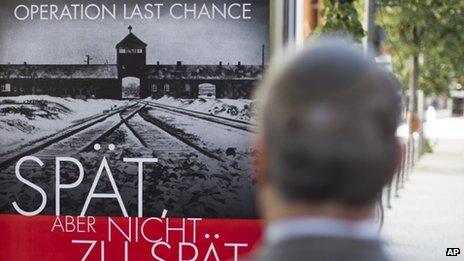German poster campaign launched to find surviving Nazis
- Published

Posters displayed in Berlin, Hamburg and Cologne say "late, but not too late"
A poster campaign has launched in Germany aimed at tracking down the last surviving Nazi war criminals and bringing them to justice.
Some 2,000 posters showing the entrance to the Nazi Auschwitz death camp and asking people to come forward with information have been displayed in Berlin, Hamburg and Cologne.
The US-based Simon Wiesenthal Center offers rewards for useful information.
It estimates there to be 60 people alive in Germany fit to stand trial.
Some are suspected of having served as guards at Nazi death camps or being members of death squads responsible for mass killings, particularly early on in the war.
"Unfortunately, very few people who committed the crimes had to pay for them," leading international Nazi hunter and the centre's Jerusalem branch director, Efraim Zuroff, said.
"The passage of time in no way diminishes the crimes."
As part of its "Operation Last Chance II" project, external, the centre is offering rewards of up to 25,000 euros (£21,500; $33,080) for information which helps to prosecute war criminals in Germany.
The centre, which is one of the largest Jewish human rights organisations, is asking for tip-offs via a hotline it has set up.
The posters depict a black and white photo of the railway tracks leading into Auschwitz and say in German: "Late, but not too late. Millions of innocents were murdered by Nazi war criminals. Some of the perpetrators are free and alive. Help us take them to court."
Auschwitz, in occupied Poland, was the biggest Nazi death camp where more than 1.1 million people, most of them Jews, were murdered.
Legal precedent
The poster campaign comes two years after the conviction of Ukrainian-born John Demjanjuk for his role as a Nazi guard at the Sobibor death camp.
Demjanjuk, who died in March 2012 at the age of 91, was sentenced to five years in prison in 2011 based solely on his service in the camp.
The centre says his conviction set a precedent allowing German prosecutors to reopen hundreds of investigations and prosecute former camp guards as accessories to murder, even if there was no proof the defendants personally killed anyone.
Germans are divided between those who think war criminals should be pursued to the grave and those, often younger people, who say the crimes are remote from present-day Germany, says the BBC's Stephen Evans.
In May, a 93-year-old former Auschwitz guard was arrested in southern Germany, accused of participating in the mass murder and persecution of innocent civilians, primarily Jews, between October 1941 and 1945.
The Simon Wiesenthal Center had named Hans Lipschis as number four in its list of most-wanted Nazis.
- Published22 August 2012
- Published2 August 2012
- Published17 March 2012